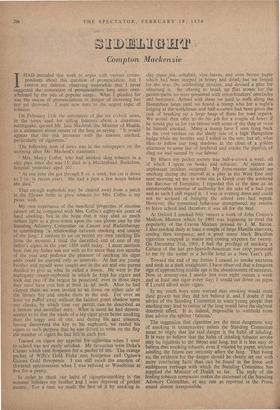Compton Mackenzie
The following item of news was in the newspapers on the morning after Mr. Macleod's statement: " Mrs. Mercy Coffee, who had smoked shag tobacco in a clay pipe since she was 15, died in a Maidenhead, Berkshire, hospital yesterday aged 101. .
" At one time she got through 8 oz. a week, but cut it down to 2 oz. in recent years. She had a pipe a few hours before she died."
That enough asphodels may be cleared away from a patch in the Elysian fields to grow tobacco for Mrs. Coffee is my pious wish. clay pipes tea, coltsfoot, vine leaves, and even brown paper which had been steeped in honey and dried, but we longed for the true, the unblushing nicotine, and devised a plan for obtaining it. By offering to break up flint stones for the garden-paths we were presented with stone-breakers' spectacles and hammers. Armed with these we used to walk along the Hampshire lanes until we found a tramp who for a night's lodging at the workhouse and half-a-crown had been given the task of breaking up a large heap of flints for road repairs. We would then offer to do his job for a couple of hours if he would pay us for our labour with some of the shag or twist he himself smoked. Many a tramp have I seen lying back in the cool verdure on the shady side of a high Hampshire hedge while my brother and I toiled in the sun; but ah, what bliss to follow our long shadows at the close of a golden afternoon to some lair of boyhood and smoke the pipefuls of shag we had earned by our labour.
By fifteen my pocket money was half-a-crown a week, all of which I spent on books and tobacco. At sixteen an unpleasant incident occurred. My form-master noticed me smoking during the interval at a play in the West End and next morning set me to write out in Greek over the weekend the Bacchae of Euripides; I regarded this at the time as an unreasonable exercise of authority for the sake of a bad pun and as such I still regard it. 1 was in evening dress and could not be accused of bringing the school into bad repute. However, this tyrannical behaviour strengthened my resolve to leave school and therefore it was all for the best.
At Oxford I smoked four ounces a week of John Cotton's Medium Mixture which by 1901 was beginning to rival the popularity of the Craven Mixture praised by J. M. Barrie. I also smoked daily at least a couple of large Manila cheroots, costing then twopence, and a good many black Brazilian cigarettes wrapped in maize and costing sixpence for twenty. On December 31st, 1901, I had the privilege of smoking a Cabana of the last pre-Spanish-American war crop presented to me by the waiter in a Seville hotel as a New Year's gift.
Toward the end of my forties I ceased to smoke mixtures and took to a dark straightcut; I have observed that a frequent sign of approaching middle age is the abandonment of mixtures. Now at seventy-one I smoke just over eight ounces a week and at least one cigar every day; I would cut down on pipes if I could afford more cigars.
In my youth boys were warned that smoking would stunt their growth but 'they did not believe it, and I doubt if the advice of the Standing Committee to warn young people that smoking may lead to cancer of the lung would have the slightest deterrent effect. It is, indeed, impossible to withhold from that advice the epithet ' fatuous.'
The suggestion that cigarettes are the most dangerous way of smoking is unimpressive unless the Standing Committee mean to imply that the real danger is the habit of inhaling. It is easy to believe that the habit of inhaling tobacco smoke may be injurious to the throat and lung, but it is less easy to believe that smoking tobacco, even if vitiated by paper, without inhaling the fumes can seriously affect the lung. That being so, the evidence for the danger should be clearly set out with more convincing facts than can be found in the loose and ambiguous verbiage with which the Standing Committee has supplied the Minister of Health so far. The reply of the leading tobacco companies makes the statement of the Standing Advisory Committee, at any rate as reported in the Press, sound almost irresponsible.


































 Previous page
Previous page